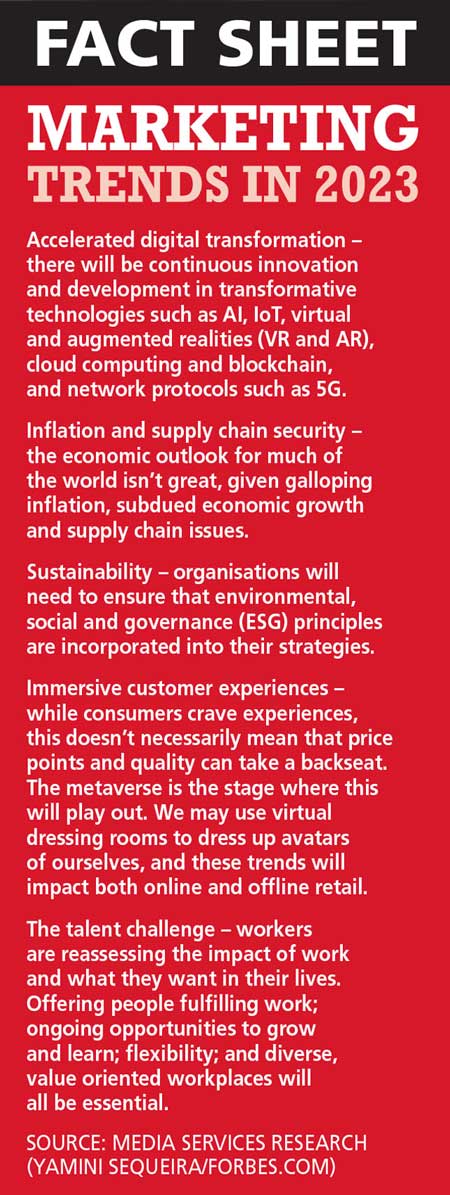STATE OF BUSINESS
SURVIVAL MODE
Compiled by Yamini Sequeira
TIME TO INNOVATE OR DIE!
Kanchana Bamunuarachchi urges businesses to innovate for their very survival
An ongoing economic crisis and the COVID-19 pandemic have made it imperative for Sri Lanka’s corporates and marketers to adopt strategies and tactics that assure business continuity, customer stability and revenue growth, to tide over these unpredictable and unprecedented times.
Elaborating on some of the major challenges, Kanchana Bamunuarachchi says that “consumers are paying close attention to how brands are responding to the current situation. Listening, reporting and quickly adapting to consumer concerns are vital in protecting brands.”
She adds: “An increased consumer focus on brand perceptions and managing the ‘4Ps’ – viz. product, price, place and promotion – is very important to maintain brand perceptions.”
CUSTOMER FACTOR An economic crisis and the pandemic created a situation where consumers no longer have access to brick and mortar products, and services support systems. They moved almost entirely to online and digital platforms instead.
Even after some of the impacts of the above eased off, the shift to online and digital modes continued and overwhelmed call centres, in addition to making managing customer perceptions online a demanding task.
“These macro factors also created an environment where buyers were mostly immobile and traditional marketing techniques were obsolete. This created a challenge for marketers to be agile, and develop suitable marketing mixes and messaging strategies – including the need for a strong digital strategy,” she observes.
Bamunuarachchi asserts that a marketer’s role entails ensuring the sales cycle (from demand creation to last mile logistics) is completed. The impact of these factors has affected the completion of the sales cycle and caused customer dissatisfaction.
Commenting on product and service availability, she says: “Current macro factors have led to a situation of scarcity and high inflation affecting affordability, which are increasing customer dissatisfaction.”
“Creating product and service offerings that are available and affordable, to avoid losing consumers and maintaining their loyalty, remain among the greatest challenges faced by marketers today. Moreover, they now have to overcome all these challenges with much tighter budgets,” she points out.
In a volatile environment where age-old marketing rules don’t apply, marketers have had to innovate. Bamunuarachchi reveals that “in their quest to stay on top and survive, they’re pushed to innovate. In my view, innovation within and outside the marketing rule book is happening. And innovation within the rule book is the most important factor.”
She cites the example of new cooking equipment such as infrared and induction cookers being introduced to the market.
“In the ‘alcobev’ industry too there have been many new product innovations based on market insights. However, we have always ensured that product quality is never compromised and this has enhanced customer loyalty to our portfolios,” she assures.
Innovative methods are being used to complete the sales cycle. When transportation was becoming a challenge due to the fuel shortages for example, bicycles were used to complete the last leg of the delivery process. Now marketers are using advanced survey tools and customised ‘social listening’ dashboards, to monitor customer behaviour and manage brand perceptions.
BUSINESS DRIVERS Asked whether she feels that adequate support is provided to manufacturers and industries in Sri Lanka, Bamunuarachchi responds: “I think industries should create and obtain the necessary support. That is happening to a great extent in these challenging times.”
“We see manufacturers in industries – and sometimes, even across sectors – working together and leaving aside their traditional competitive rivalry for the greater good of industry, and the country. This is very important for both survival and growth,” she notes.
However, greater planning and prioritisation have to take place in Sri Lanka to provide adequate support to the nation’s manufacturing industry, she feels. And Bamunuarachchi thinks there needs to be a sharper focus on building and growing important local businesses.
Furthermore, processes and procedures should be revisited – for instance, reducing red tape – to make doing business in the country more efficient. This is particularly important in shaping businesses that are locally and globally competitive.
Under present circumstances, a reduction in disposable incomes is a threat to consumption. And Bamunuarachchi’s quick fix solution for the economy is to innovate.
She prescribes: “This is a time to be innovative in all your business strategies. All enterprises should review the economic outlook and consumer mindsets – and be quick to innovate in all areas of their business. They need to ensure that products and services remain available and affordable to fulfil the needs of buyers to make sure that consumers remain loyal to brands despite the challenges.”
KEY CHALLENGES Sustainability of resources is becoming a major priority for organisations as much as nations. For the manufacturing machine to work, all resources should be sustainable.
Bamunuarachchi cautions that “whether it is people, energy or materials, the scarcity of one will make the entire manufacturing machine redundant.”
Under conditions of scarcity and attendant challenges however, businesses and the country as a whole should take a step back, and understand the status of availability. They should then create a map for sustainability based on prioritisation.
Beginning with fulfilling basic needs and moving on to sophisticated value additions, such a map should be suitably planned and timed in the present context.
She believes that marketers are fully aware of their consumers’ needs and behaviours, and should take the lead in guiding organisations to create sustainability maps to fight the twin battles of unavailability and unaffordability.
Meanwhile, Bamunuarachchi considers 2023 to be a year of “challenge and opportunity” for industry in general in Sri Lanka.
She notes: “While the economic backdrop is one of the most challenging Sri Lanka has ever seen, 2022 was a year in which there was innovation not only in terms of products and services but how we do business too.”
In summing up, she explains: “The present moment is a great opportunity for marketers to be the North Star on this journey of finding success at a most challenging time.”








